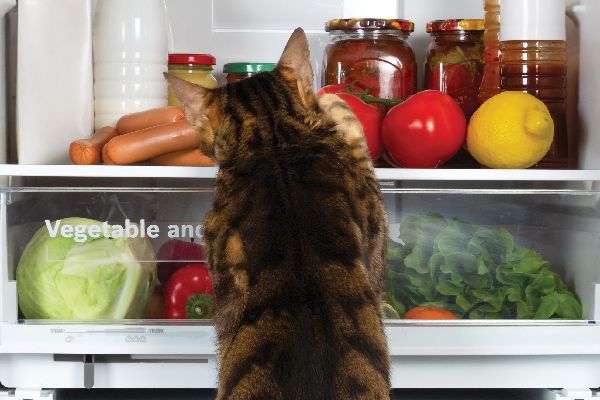Next time you catch your cat napping in a sliver of afternoon sunlight, think tiger. Think lion. You wouldn’t think a lion or tiger would eat a plant-based diet, right? Of course not! Big cats are obligate carnivores, which means eating meat is absolutely biologically essential to their survival.
Your little tiger isn’t much different. Domestic cats are true obligate carnivores who must eat meat in order for her body to receive certain vital compounds for her long-term health and well-being.
Cats need more protein than humans or dogs, according to Deborah E. Linder, DVM, MS, board-certified veterinary nutritionist, head of the Obesity Clinic for Animals at Cummings School of Veterinary Medicine at Tufts University. Kittens need more protein than most other animals, and adult cats need two to three times more protein than dogs, she adds.
Vegetarian or vegan diets fail to provide the amino acids necessary for proper feline health and are too high in carbohydrates that cats have not evolved to be able to process, according to Marla McGeorge, JD, DVM, a feline specialist consultant in Portland, Oregon.
(Is being vegan healthy for YOU? Come find out >>)
Obligate carnivores — what exactly does that mean?

Before we go any further, let’s clear about what exactly obligate carnivores are:
- Required (adjective): ob•li•gate • biologically essential for survival • restricted to one particularly characteristic mode of life
- carnivorous (noun): car•ni•vore • an animal that feeds primarily or exclusively on animal matter
Must-have nutrients for cats
One vital amino acid that cats can’t get from any source other than animal protein is taurine. Cats can’t make taurine from other amino acids as most mammals can, said Joe Bartges, DVM, PhD, DACVIM, DACVN, Professor of Internal Medicine and Nutrition at the University of Georgia College of Veterinary Medicine.
When cats are fed a diet too low in taurine, they can suffer retinal degeneration, dilated cardiomyopathy and reproductive issues, according to Dr. Linder. While all cat foods should include taurine, she says, the total amount in the diet is not the only important factor. Other ingredients in the diet can affect how taurine is broken down in the gut and how bioavailable it is to the cat, so it’s important to feed a diet that has been carefully formulated and tested, she adds.
Cats also lack the enzyme needed to make their own arginine, another amino acid found in animal protein, so it must be provided in higher amounts in their diet, according to Dr. Linder. Arginine is involved in removing ammonia from the body; if this function is impaired, cats can suffer weight loss, vomiting, neurological issues and even death.
A meat-rich diet also provides vitamin A, a nutrient that cats are unable to convert from beta-carotene, as well as other certain key nutrients, including arachidonic acid and vitamin B12, which can’t be sufficiently obtained from plant-based foods , says Dr. Bartges. Without a steady supply of these nutrients, cats can suffer from liver and heart problems, not to mention skin irritation and hearing loss, he says.
Feline diets also need added niacin and vitamin D3, according to Dr. Linder.
What protein is best for cats?

As to which animal protein is best for these obligate carnivores — beef, chicken or fish — there is no one best type, according to Tony Buffington, DVM, PhD, DACVN, emeritus professor of veterinary clinical sciences at Ohio State University’s College of Veterinary Medicine .
In fact, it doesn’t really matter if a cat gets her protein from dry or wet food, as long as she eats the food and it satisfies her nutritional needs, says Dr. Buffington. The key is to review the label. Commercial cat food labels should say that the product is formulated to meet Association of American Feed Control Officials nutrient profiles and complies with its guidelines, meaning it’s nutritionally complete, balanced and appropriate for your cat’s age. Of course, if your cat has specific nutritional needs, always follow your veterinarian’s recommendations, he adds.
Thumbnail: Photography ©Nataliia Pyzhova | Getty Images.
About the author
Ellyce Rothrock spent half her life with Flea, a Maine Coon who lived to be 21 and is missed every single day. She’s currently seeking a feline friend to manage Fritz and Mina, her German Shepherd rescues. She’s lucky enough to live her passion for pets as a 25-year member of the pet media industry.
